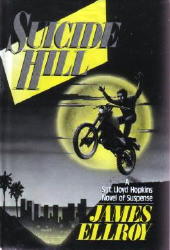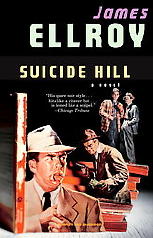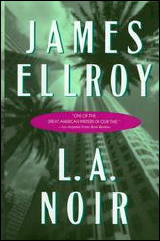Thu 18 Jun 2009
JAMES ELLROY – Suicide Hill. Mysterious Press, hardcover, 1986; paperback, April 1987. Reprinted in hardcover with Blood on the Moon and Because the Night as L. A. Noir, Warner, 1998. Trade paperback reprint: Vintage, 2006.

Readers and moviegoers of the nineteen forties and fifties didn’t know it at the time, but they were living through the first wave of the harsh, moody, downbeat suspense novels and films we now describe as noir.
Since around 1970 we’ve been battered by a second wave of noir in print and on the screen: Joseph Wambaugh, George V. Higgins, Elmore Leonard, James Crumley, Dirty Harry, The French Connection, Death Wish, Chinatown, Taxi Driver, Body Double — only this time the imagery is in color, not black-and-white, the sex and violence are graphic, not poetic, and the sense of sleaze is overpowering.
For better or worse, it’s the books and films of the neo-noir configuration that most vividly shape our perception of American urban life today.
James Ellroy is part of that configuration. He was born in 1948 and marked forever at age ten when his mother was strangled to death by a man she’d picked up in a bar. He drifted into the hippie-druggie subculture of the Vietnam years.
“From ’65 to ’77,” he says, “I lived mostly on the streets, flopping out in parks, with about fifty arrests for drunk, trespassing, shoplifting, disturbing the peace, and other Mickey Mouse, booze-related misdemeanors. I imagine I did a total of about six months’ county jail time.

“I almost croaked from a series of booze- and dope-related maladies early in ’77. Realizing that it was live or die, I opted for life. I’ve been sober since August of ’77.”
He began writing a year or two later. Suicide Hill is his fifth novel in as many years and the third of his police procedurals featuring L.A.P.D. detective sergeant Lloyd Hopkins, Los Angeles’ version of Dirty Harry.
The Hopkins books are contrapuntally structured, with the alternation of perpetrator-cop-perpetrator-cop chapters borrowed from Wambaugh’s 1974 classic, The Onion Field, and are punctuated with blood orgies borrowed from neo-noir movie directors like Brian De Palma.
By Ellroy’s standards the first half of Suicide Hill is quiet and almost sedate, introducing the sleaze ball cast — a white psycho, a Chicano psycho, the Chicano’s weak-willed kid brother, the coked-out porn video star by whom the white psycho is obsessed, a call girl with a master’s in economics and a habit of reading George Gilder’s capitalist manifestos between tricks — and setting us up for confrontations between each of these characters and Crazy Lloyd Hopkins.
The blood and brains flow in earnest during the book’s second half, with five gruesome killings between pages 149 and 168 alone, as Hopkins comes closer and closer to the showdown which, for weird reasons of his own, Ellroy never lets happen.

Crazy Lloyd is a walking time-bomb, clearly just as sick as the pervs and perps he deals with. He routinely commits burglary to obtain evidence and perjury to get convictions. He fantasizes maiming the people he hates, such as a left-wing lawyer or his estranged wife’s new lover, and every so often he makes good on his dreams.
Ellroy draws all sorts of parallelisms between cops and creeps, but at the same time he wants us to accept Hopkins as a Jesus of the gutters, the way Wambaugh portrays his own police heroes. It’s one of Suicide Hill‘s many weaknesses that Ellroy never fuses the two sides of his protagonist’s character into a unity.
There are other problems, too: key scenes that are nearly incomprehensible, slipshod construction in spots, constant grammatical flubs that betray the white heat in which the book was written. And yet with all its faults this book has power. Ellroy is a master of the single most crucial neo-noir skill: he can make the nightworld of sleaze and street monsters come alive on the page.
At one point he has a character “wondering if the world was nothing but wimps, pimps, psychos and sex fiends.”
For Ellroy, child of violence and the city, the answer is Yes, and so far he has not conjured up an effective redeemer. If you can stand the relentless assault, on every level from physical butchery to sex abuse to four-, ten-, and twelve-letter words to racist humor, this is a perversely fascinating evocation of a world gone mad.
Bibliographic Update: The three novels included in L. A. Noir (see above), were the only appearances of Sgt. Lloyd Hopkins in print.
June 18th, 2009 at 5:34 pm
For me these early Ellroy books are mostly interesting for how they reflect themes in his later better books. He’s not always a pleasant writer, and that dark vision occasionally overpowers everything else. In recent years his output has been sparse compared to his early years.
Ellroy can certainly write and I will continue to read him, but more as a novelist than a genre writer. His obsessions have taken him beyond the genre and genre concerns, and while his books are still about cops and crooks they are now sort of a twisted history of the backside of American society, politics, and national angst.
Still, that said it would be hard to top L.A. Confidential or The Black Dalhia, the latter reflecting Ellroy’s lifetime obsession with the Dalhia murder. You have to wonder though where his future work will take him if it becomes any darker or more nihilistic. At this point he is approaching the sort of apocalyptic vision that marked the novels of Louis-Ferdinand Céline filtered through the novel of crime.
Whatever the result it will be interesting to read.
Still, in some of the shorter work published in recent years the streak of dark humor in Ellroy’s work has emerged, so maybe he will go that way. In either case he is worth the effort to find out.
June 18th, 2009 at 6:05 pm
His output is less, but what he writes is deeper and more complex. I think there has to be a trade off. I read the Hopkins books back when they first came out and I found myself both drawn to and repulsed by the main character. I much prefer Ellroy’s Black Dahlia and the whole LA series. Great work. His writing style, evident in his last couple books, takes some getting used to, all the short sentence fragments and such. Not sure i like that much, but he can create compelling narratives.
June 18th, 2009 at 9:38 pm
There was a time in the mid-1980s through the early 1990s when I wasn’t reading much detective or crime fiction at all, no more than a handful of books a year. I’d read the first two Ellroy books (Brown’s Requiem, 1981, and Clandestine, 1982, both paperback originals from Avon) and enjoyed them immensely.
But although I kept buying his books, I seem to have stopped with these two. I can’t say why — and it’s my loss at the moment — but it does give me a good chance to read the rest of his work for the first time.
I suspect, though, from all I’ve read about Ellroy, including Mike’s review, and David and Frank, your comments, that I hadn’t better read them all at once, one right after the other.
— Steve
June 18th, 2009 at 10:22 pm
About 15 yrs ago there was a documentary on Ellroy called JAMES ELLROY: DEMON DOG. In it, Ellroy claims that as a teenager he would get hopped up on speed, break into houses, find women’s panties, and then masturbate as he sniffed them.
Anyway, when I think of Ellroy, I think of panty-sniffing.
June 19th, 2009 at 10:56 am
Sometimes I guess you can’t help it. You get certain pictures in your head, and they won’t go away.
And now I sort of wish that you hadn’t brought it up…
June 19th, 2009 at 2:39 pm
My apologies. I just couldn’t resist…
June 19th, 2009 at 4:32 pm
Ellroy has a perverse streak in that he would prefer to shock you rather than just entertain you. He’s one of those people who will say almost anything just to get a reaction. Not that what he says isn’t true …
Steve
Do read at least the LA trilogy L.A. Confidential, The Black Dalhia, and The Big Nowhere — some of the later ones are a bit harder going due to his experiments with style and voice and his movement toward the mainstream (though hardly the sedate mainstream and they are still crime novels). But those three are among the best hardboiled novels written, and the product of a singular vision.
On the other hand it should be pointed out that talent doesn’t always attach itself to perfect people. Ellroy is a genius, but an eccentric and even troubled one (with that childhood it’s a wonder he’s even alive and halfway sane, much less a major writer). Though the subject matter is different and the style is different his approach is closer to a William Burroughs than Hammett or Chandler. His vision in apocalyptic, savage, and dark. The comparison to Wambaugh is good, but Wambaugh on steroids, uppers, and sterno,with a good deal of James Crumley thrown in, and maybe a touch of Céline (not Dion, but the French novelist).
But the man can write —damn can he write.